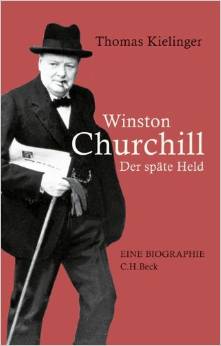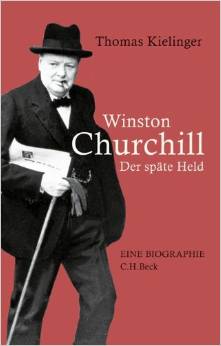
Finest Hour 168
Books, Arts & Curiosities – Winston Churchill, Der Späte Held

September 6, 2015
Finest Hour 168, Spring 2015
Page 43
Thomas Kielinger, Winston Churchill, Der Späte Held. C.H. Beck, 2015. €24.95
Review by Alan Watson
 Thomas Kielinger has been doing his best to explain the British to the Germans since 1998, when he became the London correspondent of the powerful German newspaper Die Welt. He has now decided to explain the Churchill phenomenon to the Germans, a daring venture, since most Germans who know about Churchill focus entirely on his role in defying Hitler in 1940 and his subsequent leadership of Britain through the Second World War. A smaller number of them are aware of Winston Churchill’s Iron Curtain speech at Fulton, Missouri, and even fewer know of his speech six months later in Zurich, Switzerland, in which he startled his audience by calling for a partnership between France and Germany to lead Europe’s economic revival and moral regeneration.
Thomas Kielinger has been doing his best to explain the British to the Germans since 1998, when he became the London correspondent of the powerful German newspaper Die Welt. He has now decided to explain the Churchill phenomenon to the Germans, a daring venture, since most Germans who know about Churchill focus entirely on his role in defying Hitler in 1940 and his subsequent leadership of Britain through the Second World War. A smaller number of them are aware of Winston Churchill’s Iron Curtain speech at Fulton, Missouri, and even fewer know of his speech six months later in Zurich, Switzerland, in which he startled his audience by calling for a partnership between France and Germany to lead Europe’s economic revival and moral regeneration.

2024 International Churchill Conference
Kielinger tells a much richer and more complex tale that embraces Churchill’s youth, his adventures as a journalist and a soldier—in particular as a lieutenant in the Fourth Hussars, his spectacular escape from imprisonment by the Boers in Pretoria, his early-established celebrity status, his entry into parliament, his time as a trade minister, and then his decisive role in the first two years of the First World War in charge of the Admiralty but culminating catastrophically in the Dardanelles Campaign.
One of the most dramatic photographs in the book shows Churchill watching army manoeuvres in Germany with the Kaiser in 1909, a picture few Germans will have seen. Kielinger is excellent on the continuity and the diversity of Churchill’s career up until that point and beyond, through the inter-war period, the Second World War, his return to 10 Downing Street—this time elected directly, his eventual retirement, and death in 1965.
All the diversity of that extraordinary career is to be found in this biography, but so too is Churchill’s prolific output as author and journalist, his unmatched command of the language, the solace he found in painting, and the luxuries that were always a feature of his life. As he said of himself, he was always satisfied with the best.
But Kielinger’s “red thread” throughout the book is Churchill’s self-expression. Charismatic and courageous, Churchill was also a victim of severe phases of depression, succumbing to what he called his “black dog” moods. Esentially an optimist, he was also a realist well aware of the terrible price that would have been imposed upon him and the British people had the Nazis occupied Britain.
Germans reading this elegant and vivid account of Churchill’s life will be brought into direct contact not only with the political giant who shaped history but also the human, and therefore vulnerable, man behind the legend.
Lord Watson of Richmond CBE FRTS is Chairman of CTN Communications.
Subscribe
WANT MORE?
Get the Churchill Bulletin delivered to your inbox once a month.


